Podcasting, as a form of broadcasting born on the web and growing exponentially over the last decade or so – alongside the web itself and the massive concurrent rise of mobile devices – inherits the traits of its venerable parent, an open internet. Podcasting’s a medium that democratizes the space by providing access to everyone – whether they are consuming or creating content, at any scale – and one built on open standards that ensure integrity and accountability of the very technology behind the service.
But the internet has been growing into an ever-more narrow, locked-in field, whose freedoms are under systematic threat from a myriad of actors, not least from the now-dominant companies whom it once spawned and propelled into power, such as Google and Facebook. Perhaps inevitably then, the business models based on data collection and tracking for the sake of advertising money, adopted by big internet players, had always been destined to reach and engulf the realm of podcasting, too – like a creeping tide.
What’s worrying is that these business models establish a lopsided relationship between companies and users, where the former has all the power, rendering the latter deprived of their rights in the digital world, including the right to security and privacy. And that stands in stark contrast to the very nature of podcasting – the way it came to be, back in the day – and the way we still know it today.
But for how long?
Since it came onto the scene in 2004 as a means to distribute audio and later video files, podcasting has relied on content creators uploading their files to the internet, while users could access and download them “on demand” via open and decentralized RSS feeds. In other words: nothing stands between, or in the way of these two end-points: and certainly, not any algorithm-curated content and reality filtering, such as what Facebook and Twitter users are nowadays subjected to in their “timelines” and “news feeds” – not to mention the depressing shift Google search has undergone in recent years away from information and knowledge, and towards promoting brands and products first.
Instead, podcast makers have so far by and large chosen not to encroach on their listeners’ private lives by deploying invasive tracking – relying instead on sponsors and ads read out or displayed during audio/video shows, or by seeking donations via crowd-sourcing platforms like Patreon. None of these are harmful to the end user’s privacy – while many big and small podcasts have garnered wide-enough audience to comfortably support their business, playing by the current rules.
But Chartable, a company building podcast analytics tools, sees things from a somewhat different angle and has declared this to be the rise of “the golden age” of podcasting. A golden age, that is – with pots of gold on the horizon – at least from the point of view of companies looking to lock in and monetize the industry. Several factors have converged to lead to the conclusion that podcasting might easily be “the new TV” – i.e., that broadcasting segment that is ripe for “disruption” the way streaming services have managed to gain a foothold at the expense of traditional TV.
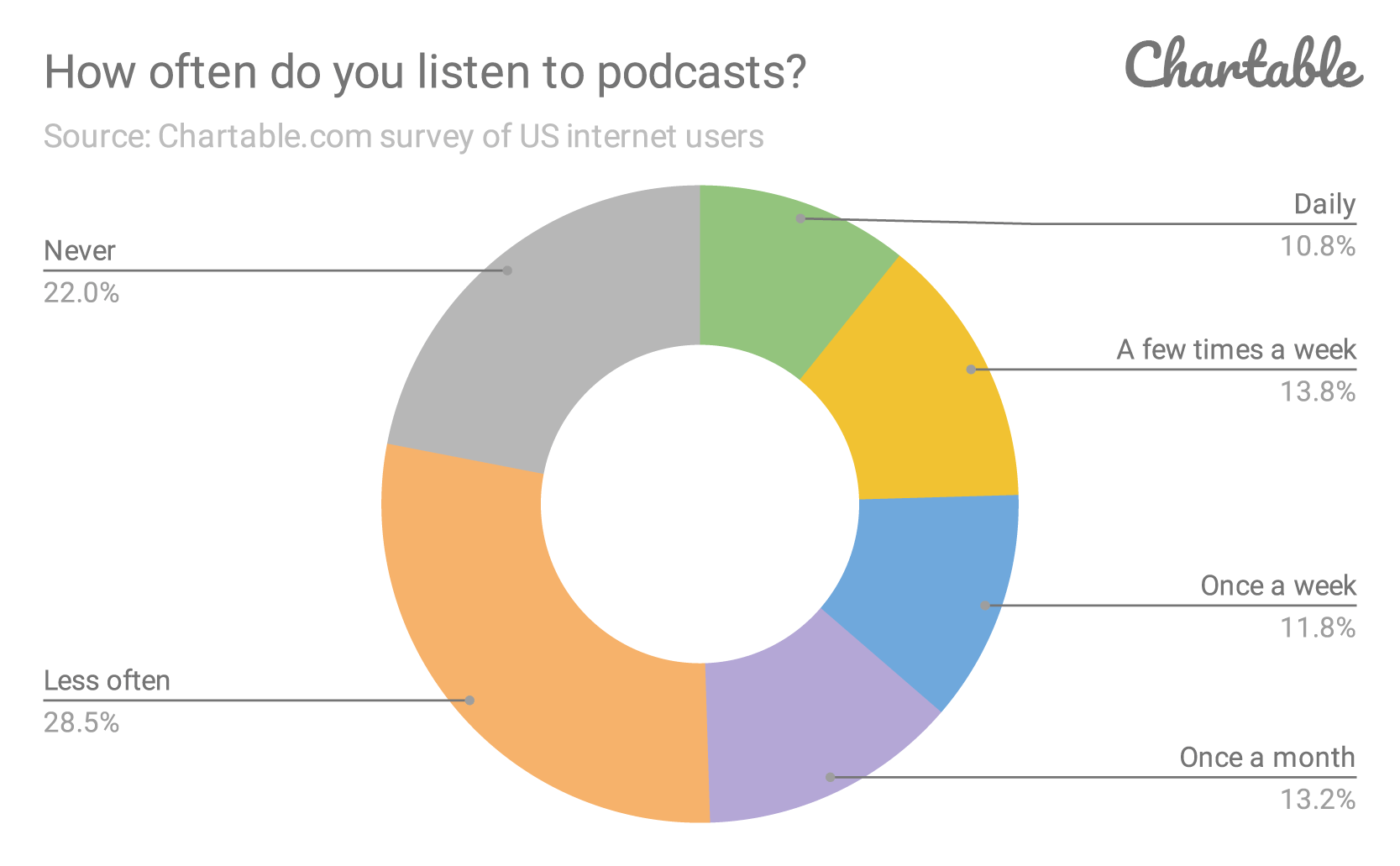
For one thing, the report paints the picture of podcasts being wholesomely awesome: anyone can make and distribute them – from global media powerhouses to one person alone with an internet connection. And it’s also a liberating way to “consume” content at any time or circumstance – these days mostly via mobile devices that are in the hands of billions of people. Podcast subscribers can listen to the news, sports, science, pop culture, and just about any niche content out there as they commute, run errands, shop, or do household chores. No more time wasted on mindless tasks – a compelling proposition to be sure, and one that has seen a massive surge in adoption in the last year alone.
According to Chartable, there are now over 670,000 podcasts tracked by the company on Apple Podcasts directory alone – with more than 210,000 of these shows making their debut in 2018.
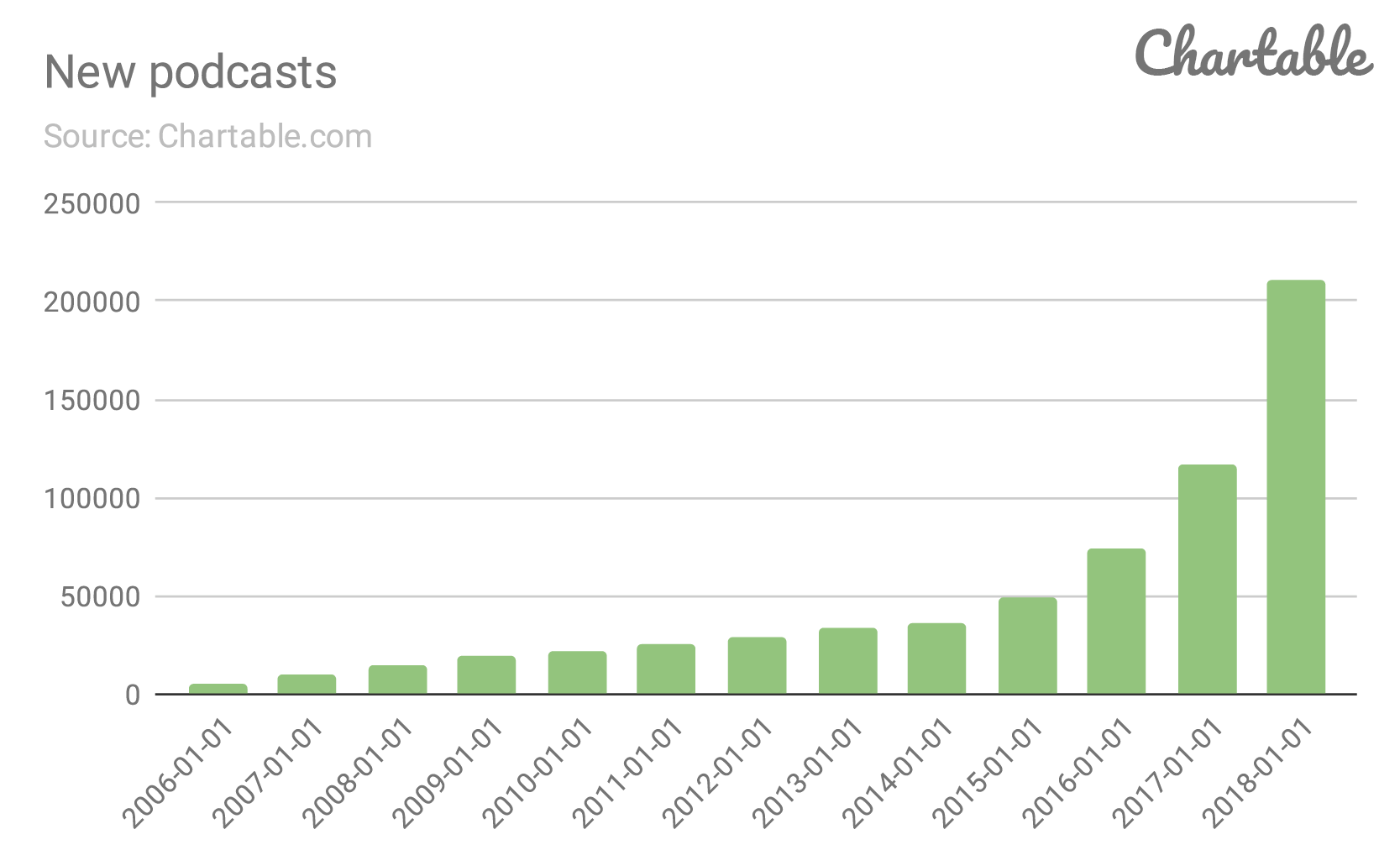
In the US alone, 23 to 25 percent of adults said they listened to podcasts every day, or several times a week – that’s about 60 to 91 million people, the Chartable survey noted. Now, this massive emerging market has attracted the attention of businesses such as Spotify, founded as a music streaming service. And while the company is the global leader in the segment – don’t let that fool you. Spotify has been struggling to monetize within the music industry that gives the bulk of its revenues to labels and artists. In other words, Spotify desperately needs to diversify, and they now seem to have picked their target – going all-in on podcasting.
Anchor and Gimlet Media – a top-notch podcast producer, and a podcast hosting platform, respectively – have been among Spotify’s recent acquisitions, costing the company hundreds of millions of dollars – where the industry itself fell short of the figure, the report observed.
But these acquisitions’ future value to Spotify may include ownership of open databases and tracking tech, while introducing subscription paywalls. In other words, not so much “disrupting” the podcasting industry – as the very web that it relies on.
This is also true because the way podcasting has worked so far allowed cross-platform apps, known as “podcatchers” to lets users subscribe using open databases, such as Apple’s iTunes/Podcasts.
Apple’s own podcasting app, that continues to dominate the market in the US, uses this very technology relying on open RSS. Apple, as traditionally a hardware company, has not had to rely on invasive tracking and advertising to make money – at least not thus far.
In recent tech industry history, there have been many good practices, from securing personal and data safety, to anti-tracking privacy and encryption methods – that all inevitably hit the snag again and again for their lack of “user-friendliness” and “ease of use.” Spotify may well have this in mind as it plays into the hands of creators looking for easy and fast deployment of their content.
But that’s not all. Bucking the trend away from open toward a walled garden approach is the National Public Radio (NPR) – an American privately and publicly funded non-profit that hosts some of the most popular podcasts in the world – such as This American Life, Radio Lab, and Planet Money.
In the spring of 2018, NPR bought PocketCasts – a popular podcasting app that gave it access to large quantities of user data, only to later the same year announce a crucial tool for anyone wishing to measure the metrics of their data-tracking based business: Remote Audio Data. The short and the long of it: the tool is tracking users to find out what segments of the podcasts that they downloaded have actually been listened to – specifically, what ads may have been skipped. Something that The Verge has dubbed to be “the Facebook-ification of podcasts“.
That’s not all: There is a new paid subscription service “Luminary” that launches today, one that’s been criticized from the moment it was even announced.
The podcasting industry itself has not reacted well.
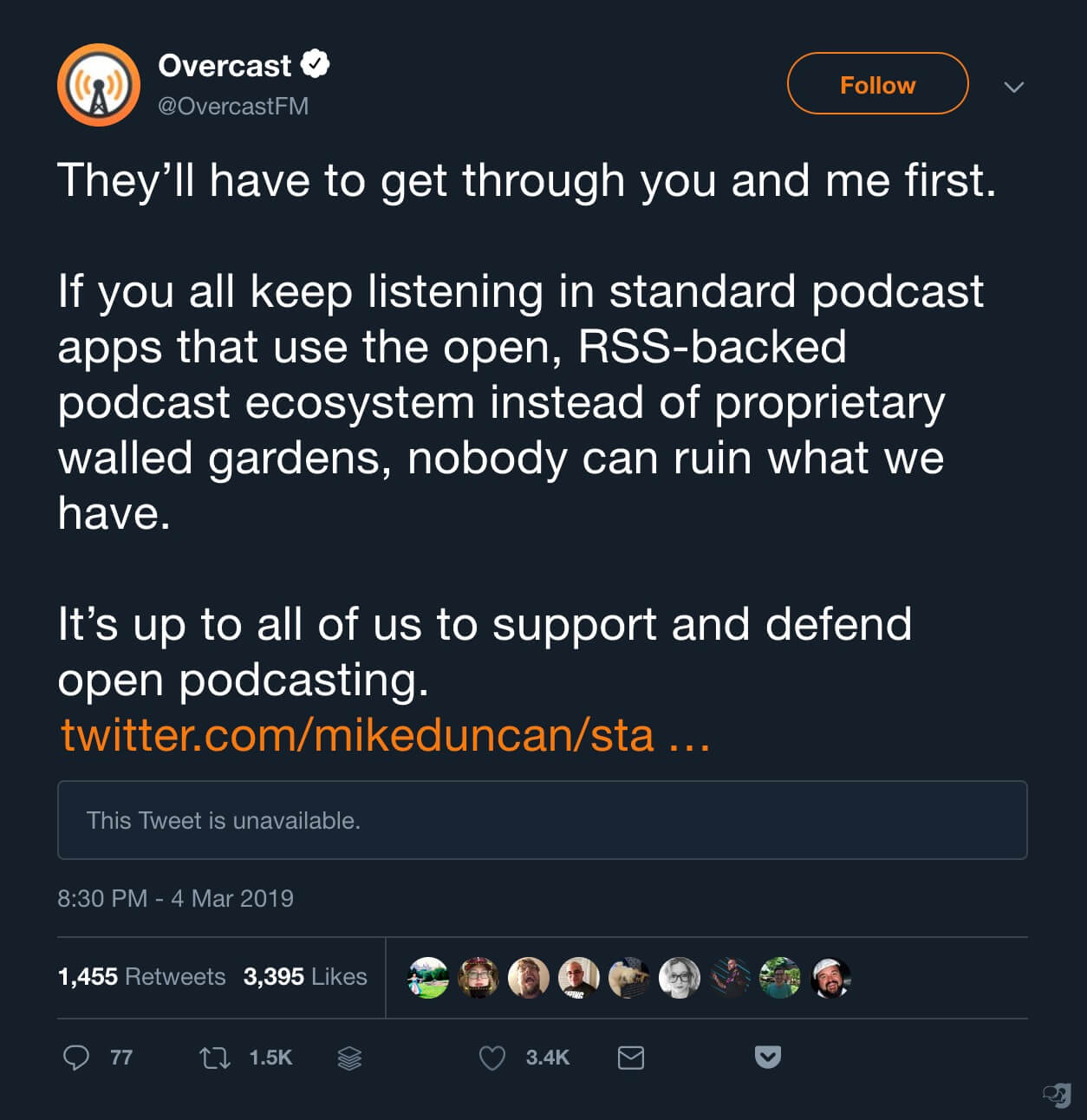
“They’ll have to get through you and me first.If you all keep listening in standard podcast apps that use the open, RSS-backed podcast ecosystem instead of proprietary walled gardens, nobody can ruin what we have. It’s up to all of us to support and defend open podcasting,” Overcast app said on Twitter.
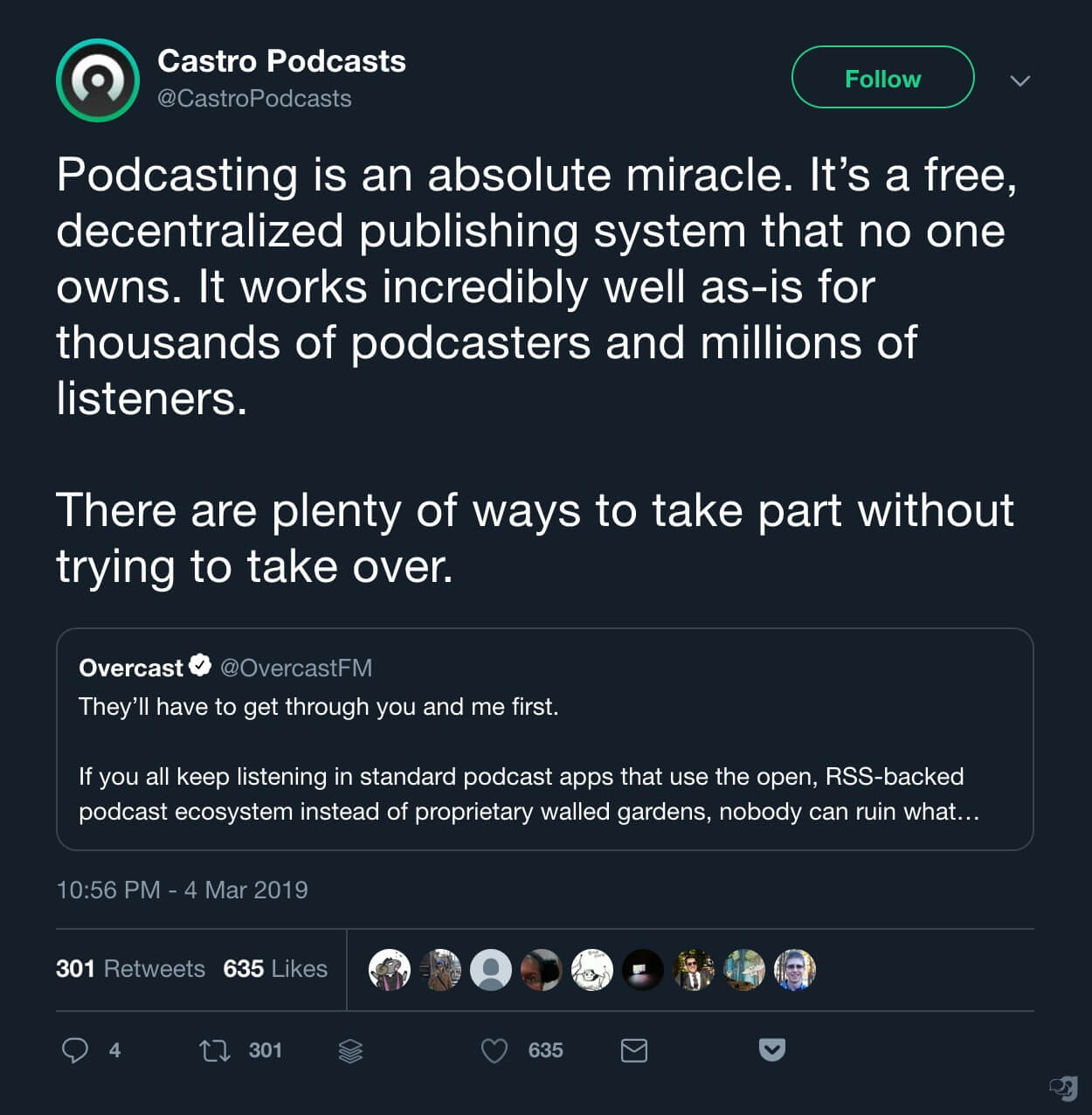
“Podcasting is an absolute miracle. It’s a free, decentralized publishing system that no one owns. It works incredibly well as-is for thousands of podcasters and millions of listeners. There are plenty of ways to take part without trying to take over,” Castro Podcasts said.
Mike Duncan, the creator of the Revolutions History podcast, tweeted the following:
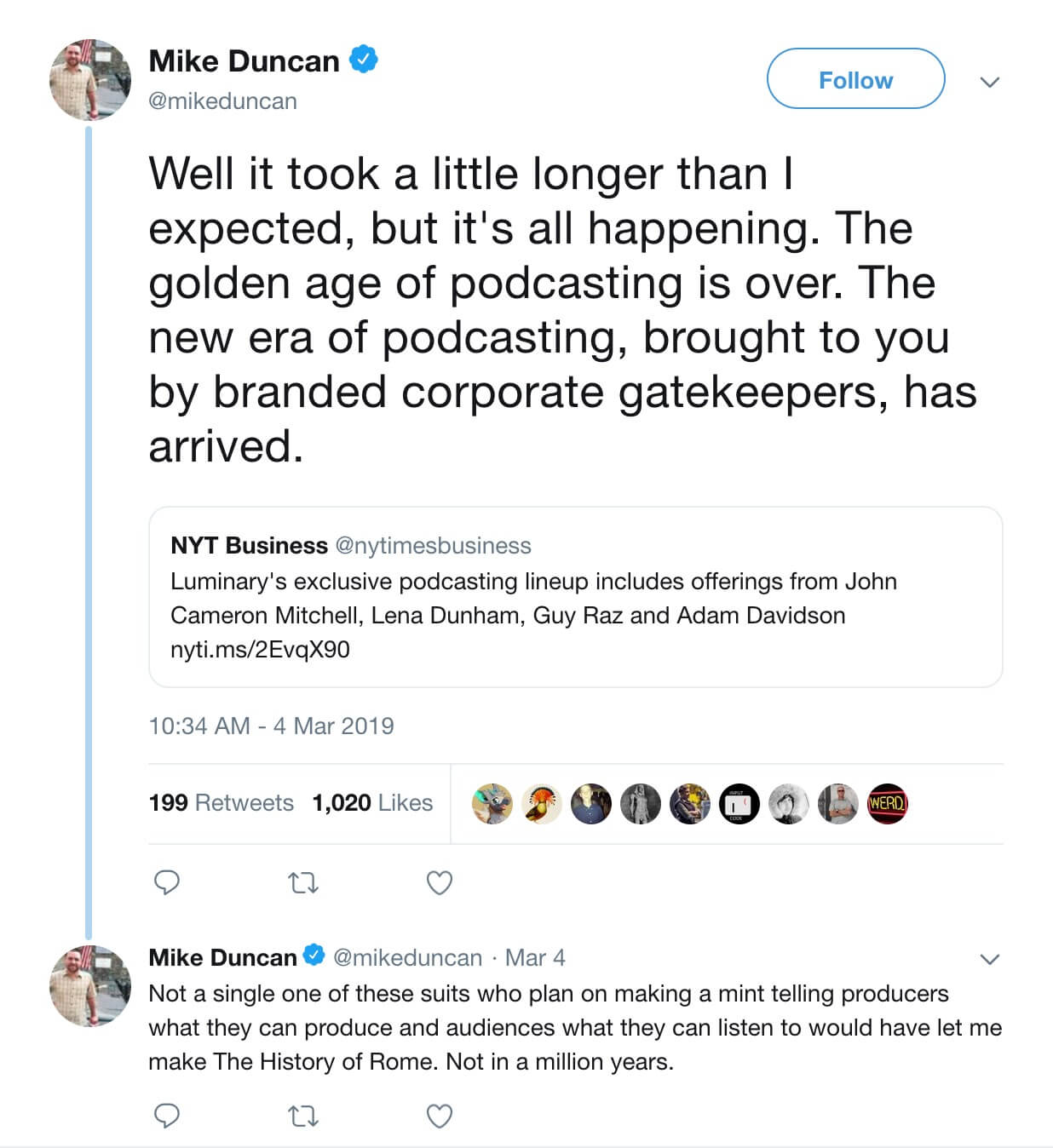
“Well it took a little longer than I expected, but it’s all happening. The golden age of podcasting is over. The new era of podcasting, brought to you by branded corporate gatekeepers, has arrived.”
In short – forces seem to be converging onto a plucky old platform that has so far managed to desist and live up the promise of the original, free web, even this late into the process.
But as this podcasting “golden age” may be dawning for publishers and even creators – who may have finally figured out the elusive formula of monetizing the medium – podcast consumers may be headed for a big chill – facing constraining, privacy-invasive practices, and paywalls.
It may be the right time for anyone looking for a quick-to-medium buck by employing ruthless monetization right now, to stop and take pause. Doesn’t banishing concepts and technologies that made the web such a force to be reckoned with in the first place rank tantamount to undermining and uprooting the very promise – not to mention the technical premise – that this online mix of freedom, opportunity, and power has been built on? And would a step back and a look at the big picture not be advised right now?
In other words: should the internet, and its ever more lucrative associated services continue down this path of invasive lock-ins and tracking that undermine its very nature – and will that not lead to the internet – hailed as “the 4th Industrial Revolution” in some quarters – ending up devouring its own children?
If you're tired of censorship and dystopian threats against civil liberties, subscribe to Reclaim The Net.









